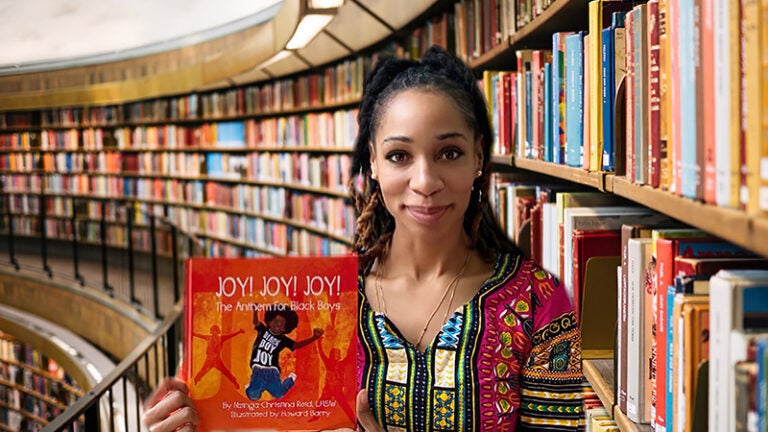
Alumna’s activism focuses on helping Black children find their joy
I’ve got joy on the inside of me
I look in the mirror and like what I see
— from Joy! Joy! Joy! The Anthem for Black Boys
As a social justice and anti-racism activist, Nzinga-Christina Reid spent years protesting, organizing and advocating on behalf of Black communities in the United States. But now, as a mother, she has turned to storytelling as a way to elevate Black stories and teach others, particularly Black children, that there is pride and happiness in Blackness.
“So many times, especially during Black History Month, when we hear about the Black experience, it’s coupled with oppression, systemic racism, despair, lower pay, high incarceration, poor schools,” she says. “My book is really about just trauma-free Black joy. It doesn’t have to be coupled with anything else negative to stand out and to be beautiful. It’s just trauma-free Black joy.”
Reid, who graduated with a bachelor’s degree in sociology from the USC Dornsife College of Letters, Arts and Sciences in 2012, is now a licensed master social worker in New York City, where she currently lives with her husband and two children.
Reid says that becoming a parent is what inspired her to write Joy! Joy! Joy! The Anthem for Black Boys (Black Diaries, 2020) and its companion book, Joy! Joy! Joy! The Anthem for Black Girls, scheduled to come out in March 2021. Both books were created as part of Reid’s The Black Diaries project, which aims to keep the stories of Black people alive through storytelling and promoting children’s literacy.
“I can’t really go to protests as much because … I have to make sure that I’m making it home at night and I’m not sitting in a jail cell somewhere. So that’s how my activism has changed to really just writing children’s books, encouraging diversity in literature,” she explains.
Accepting Blackness
Reid grew up Christina Wilkerson in the California cities of Bakersfield and Vallejo, in a family with a history of civil rights engagement. Her grandmother had used her house to register Black voters, and her mother took Reid and her sister to see Rosa Parks speak when they were little. Her mother, Reid says, encouraged her to accept her Blackness, but it was difficult to do so in Bakersfield, where there was little diversity and Reid wanted more than anything to fit in with her white friends and classmates. It was only after moving to the more diverse community of Vallejo that Reid found herself connecting with more people of color.
“I enjoyed living my life and being around people with whom I didn’t feel I had to assimilate or code switch. It was just people who are a part of my culture. But even now, I still have friends from both Bakersfield and the Bay Area. I say that to say that’s an expression of who I am. I’m very multifaceted,” Reid says.
Reid wasn’t clear on what her academic path would be after high school. After a few years of working, she decided to enroll in West Los Angeles College, from which she transferred to USC Dornsife.
Entering the world of activism
Two things at USC Dornsife shaped Reid’s desire to become a social worker. The first was taking a class with Associate Professor of Sociology and American Studies and Ethnicity Jody Agius Vallejo, who noticed Reid’s potential and has served as her mentor both during and after Reid’s time at USC. It was Vallejo who encouraged Reid to apply to become a McNair scholar, which she did.
“She really took me up under her wing and mentored me for the rest of my time. I could go to her for anything. And that was just so important for someone like me who needed that guidance,” Reid says.
A second influential event occurred during an off-campus party. Someone entered and attempted to steal some headphones, then pulled a gun and shot at Reid’s friend. As she tried to push her friend out of the bullet’s path, Reid was hit in the finger. In 2012, the Los Angeles police recognized Reid for her actions. The episode convinced her to become a social worker.
“Once the shooting happened, it reprioritized things for me. I was like, ‘I have work to do, and it’s more than just going to school and hanging out with friends.’ My core, my roots are embedded in activism and community service, and I had just kind of forgotten that,” Reid says.
She organized a Trayvon Martin rally, a cookout for the homeless on Skid Row and a clothing giveaway. As a result of her academic performance and community service, Reid was the 2012 Black Graduating Class valedictorian. She went on to earn her master’s degree in social work from Columbia University in 2014.
Although she is still a social worker, Reid says her focus in activism now is to “personify joy” in Black children so that they can find self-worth and happiness despite facing systemic racism.
“The world is so cruel sometimes, and it is cruel for children of color, as we know they’re treated differently in their school systems. But you still have your joy. And you are still able, like me, to defy all odds and to be successful,” she says. “You will find a way. Our ancestors are cheering you on.”